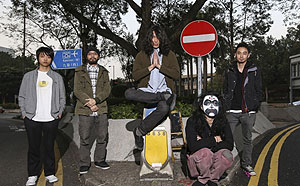Read about this band here ...
http://www.buddhistchannel.tv/index.php?id=11,11734,0,0,1,0#.UuUuphCwrIUChock Ma are not your average headbangers. During the band's rehearsals, you can hear instruments such as the didgeridoo, an indigenous Australian wind instrument, and a mouth harp, an ancient instrument popular in Southeast Asia.
The mouth harp is played by Chock Ma vocalist Jason Lau Chun-ho, and the didgeridoo belonged to a Japanese busker Lau met in Perth last year, during a working holiday in Australia.
Using ancient or ethnic musical instruments is nothing new for the five-piece band. Erhu, pipa, hulusi and a Tibetan singing bowl have all featured in their live sets, thanks to Lau's interest in sourcing traditional instruments from all over the world.
Chock Ma started out in 2003 as followers of nu metal bands like Korn, Slipknot and Deftones. Over the years, the band's music has evolved into a blend of progressive metal and post-rock, with a touch of traditional Chinese music. The band went into hibernation for two years when Lau left for a working holiday in Australia, and guitarist Tsui Chin Hung went to study guitar at the Musicians Institute in Los Angeles.
Both musicians have returned to Hong Kong, and Chock Ma is active again. The outfit made recent appearances at Clockenflap, and the Street Music concert series curated by Kung Chi Shing.
The band is due to release its debut album this spring, with a Chinese title that literally translates as "Expose the Nature from Inside". In English, they have called it Dharma Bums, borrowing from a 1958 novel by Beat writer Jack Kerouac.
Both titles hint at the Buddhist ideas that underlie the band's music. Lau and guitarist Emad Yau Wai-kuen have converted to Buddhism. But rather than being a religion, they view Buddhism as a way of thinking.
We just want to spread some positive energy to our listeners.

<< In their search for an enlightened sound, Chock Ma searched the streets and found a heavy groove in spiritual awareness and environmental issues. Photo: Sam Tsang